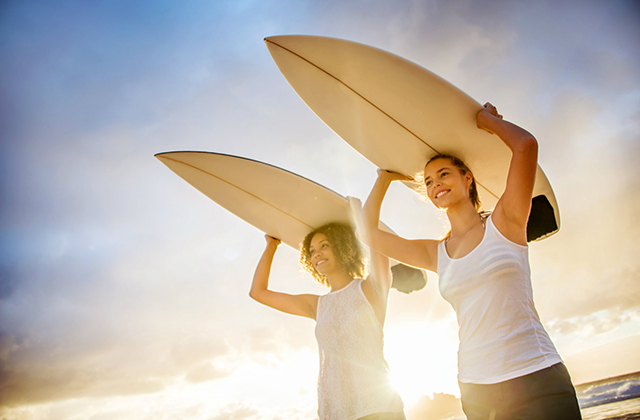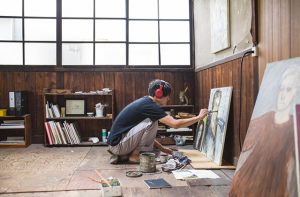Before we jump into the surfing fitness tips lets quickly go over how the current association of surfing professionals judging criteria is set out. At least, this is what I think is current. Does anyone really know with the ASP? Find and enter Surf Events and Surfing Competitions online by using surf comp app.
1) Usually five ASP judges score each wave between zero and ten points.
2) Of those five scores (per wave) the highest and lowest scores get dropped.
3) The remaining three scores (per wave) get divided by three to give a total wave score.
4) Higher score winners in each heat move into the next rounds, knocking out surfers as they go, until only two surfers battle it out in the final. It’s a little bit like a professional tennis grand slam competition.
Generally speaking judges look for the following four points in order to score each wave. These points therefore, dictate what should become a part of your surfing training protocols.
1) Power & Speed
2) Rhythm or Flow
3) Variety & Difficulty (Of each manoeuvre in steep sections of waves)
4) Speed and Improvisation
So, here are some surfing training tips that will benefit anyone who paddles out and wants to catch more waves and especially for those of you who wish to compete.
1) Train in the surf for short periods of time at high intensities and practice specific movements you need or want to master. Perform twenty to thirty minutes of intense surfing followed by a fifteen minute wind down on the beach with some goal work, reflection and re-hydration time. Repeat this three to four times. This is one of the quickest ways to quickly improve your competition surfing fitness, especially if the waves are pumping.
2) Know your strengths and know your weaknesses. With surfing it is always good to play your strengths yet many surfers forget to focus on building their surfing weaknesses. How is your back hand, air game, small wave surfing, big wave surfing, etc. We all have preferences and strengths and we all have weaknesses. All round surfers have a knack for improving and working on what they need to work on and you can too.
3) Paddle Fitness is key for free surfing enjoyment and competition, so each time you surf use the first twenty to thirty minutes to work on speed and power paddling. Catch as many waves as possible and surf your brains out on each wave. Even take waves that may close out or possibly put you where you do not want to be (not advisable if the surf is heavy and huge). This training strategy on smaller days however, quickly forces you to, ‘get out of the impact zone’ by training your cardiovascular system and developing speed and paddle power which will carry over into better surfing fitness. Just remember to keep your head and body still and focus on powering through with your arms and having a high elbow with each stroke.
Obviously faster more efficient paddlers means getting back into position faster and gives you more time for wave selection and getting priority as both a free surfer or competitor.
4) Power, rhythm and flow; get these ingrained into your DNA. Golf, martial arts, dancing, gymnastics for surfers, skateboarding, snowboarding can all help with your surfing training and performance conditioning. All are fun and easy to do and all quickly carry over into your surfing. Many of these sports or disciplines also allow for innovation that is also scored when surfing.
4) Surfing is a lot like golf. It’s all about consistency. The more consistent you are with your performance the more likelihood of getting consistently higher scores. If your surfing game is inconsistent, judges know this and their subconscious minds click in with ‘doubts’ on every wave they judge you on. So consistently choose good waves, surf all out and know that your highest score will be dropped. When you think about it – getting a perfect score for one wave means all judges must be scoring very highly and consistently across the board.
5) Practice big moves in big sections because that is what scores highly. If you fall then there is more duck diving, more impact zones and more challenge getting back into position. Combine this with mentally going over how to improve on the next wave, will all add to your surfing fitness and make you a better surfing athlete.
6) When you’re surf training in the gym do intense twenty to thirty minute sessions simulating heats and throw in some confusion. Get your trainer or surf coach to throw some curve balls into your surfing workout to distract you, put you off guard, to challenge you with mental games. Typically we don’t surf as well as we would have liked because of psychological challenges or external distractions, so practice dealing with these type of situations when you train.
7) Your cardiovascular system combined with stability and flexibility across the joints of your body is the base of both your flow and your surfing power. Find a trainer who surfs well and also understands and teaches all components of surfing fitness and not just stranded surfing exercises.
Hayden Rhodes has coached professional and amateur athletes improve their performance through scientific personal training, hormonal testing, nutritional coaching and performance conditioning principles.
If your a professional surfer or just getting started and want to improve your surfing body then please visit http://SurfTrainingSecrets.com.
Do you want a better body or improve as a surfer? For a free 5 day coaching guide on boosting your surfing performance please visit http://SurfTrainingSecrets.com
If you have any questions or comments simple drop me a line so that I can look help you improve your surfing body and surfing performance.
Powering Surfing Athletes
Article Source: http://EzineArticles.com/expert/Hayden_Rhodes/1006429
Article Source: http://EzineArticles.com/8498330



